新一关键句型16-20
- 格式:doc
- 大小:31.50 KB
- 文档页数:1

Lesson 1、2课文知识点:1、Excuse me! 劳驾,对不起。
当引起别人的注意的时候,或打断别人谈话,或从别人身边走过的时候用的客套话。
注意和sorry的区别。
2、Yes?用升调读,“什么事”。
和用降调不相同,用降调表示“是的”的意思。
3、Pardon? 对不起,请在说一遍。
用于口语,正式的说法是:I beg your pardon? 或 Pardon me.4、Thank you very much. 非常感谢。
同义句:Thank you. Thanks!Thanks a lot.Many thanks.回答不客气的几种方式扩充。
5、初步了解人称代词,指示代词,物主代词。
语法:陈述句句型及转换陈述句:This is…这是…陈述句的否定形式:在be动词后加not:This isn’t…这不是…一般疑问句:在系表结构中,一般疑问句把系动词前置,并采用升调阅读:Is this…一般疑问句的回答(be动词引导):Yes, it is.(肯定)No, it isn’t.(否定)例子:Is this your pen?Yes, it is / No, it isn’t.That one is my pen and this isn’t my pen.Lesson 3、4课文知识点:1、My coat and my umbrella please. 祈使句,等于 Give me my coat and my umbrella please.2、Here’s your umbrella and your coat. 这是一个倒装句式,系动词提到了主语之前,正常语序是:Your umbrella and your coat are here.3、了解物主代词中的形物代和名物代。
发音技巧:连读:第一个单词为辅音,第二个单词为元音时将连读。
如:Yes, it is.略读:两个爆破音在一起时,前一个爆破音失去爆破。

Unit 2 Let’s talk teens1.Does every dinner with your parents seem to turn into a battle?每次和父母一起吃晚餐似乎都会变成一场战争吗?(P16)2.You may feel anxious that you are developing at a different rate to your friends,shooting up in height or getting left far behind.你可能会感到焦虑,因为你的发展速度和你的朋友们不同,身高方面或者突飞猛进,或是被远远抛在后面。
(P16)3.You might worry about your changing voice,weight problems or spots.你可能会担心你的声音变化、体重问题或粉刺。
(P16)4.When it all gets too much,your parents are often the first targets of your anger.当这一切让你不堪重负时,父母常常会成为你发泄愤怒的首选目标。
(P16)5.You have both a new desire for independence and a continued need for your parents’ love and support.你既对独立充满新的渴望,又对父母的爱与支持有不断的需求。
(P17) 6.On the other hand,when you are struggling to control your feelings,youwish they could be more caring and patient...另一方面,当你努力想控制自己的情感时,你希望他们能更加体贴和有耐心……(P17)7....sometimes they forget that growing up is a rough ride.……有时候他们忘记了成长是一段艰难的旅程。
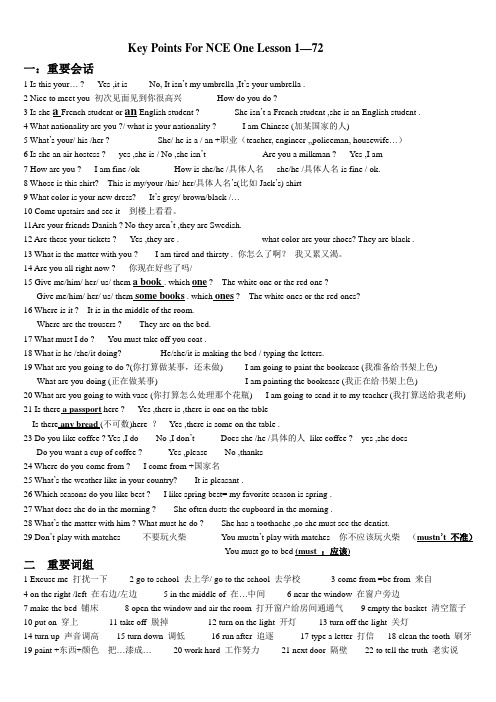
Key Points For NCE One Lesson 1—72一:重要会话1 Is this your… ? Yes ,it is No, It isn’t my umbrella ,It’s your umbrella .2 Nice to meet you 初次见面见到你很高兴How do you do ?3 Is she a French student or an English student ? She isn’t a French student ,she is an English student .4 What nationality are you ?/ what is your nationality ? I am Chinese (加某国家的人)5 What’s your/ his /her ? She/ he is a / an +职业(teacher, engineer ,,policeman, housewife…)6 Is she an air hostess ? yes ,she is / No ,she isn’t Are you a milkman ? Yes ,I am7 How are you ? I am fine /ok How is she/he /具体人名she/he /具体人名is fine / ok.8 Whose is this shirt? This is my/your /his/ her/具体人名’s(比如Jack’s) shirt9 What color is your new dress? It’s grey/ brown/black /…10 Come upstairs and see it 到楼上看看。
11Are your friends Danish ? No they aren’t ,they are Swedish.12 Are these your tickets ? Yes ,they are . what color are your shoes? They are black .13 What is the matter with you ? I am tired and thirsty . 你怎么了啊?我又累又渴。

主要语法(一)时态主要涉及的时态有:一般现在时,现在进行时,一般过去时,现在完成时,一般将来时,过去进行时,过去完成时,过去将来时1. 一般现在时表示一般性,经常性的动作或一般性事实。
含有be动词的句子例:He is a teacher.The girl is very beautiful.Tim and Jack are students.★变疑问句将be动词移到句首·例:Is he a teacher?Is the girl very beautiful?Are Tim and Jack students?★变否定句在be动词后面加not例:He is not a teacher.The girl is not very beautiful.Tim and Jack are not students.★肯定回答及否定回答例:Yes, he is. No, he is not.Yes, she is. No, she is not.Yes, they are. No, they are not.不含有动词的句子,即含有一般动词的句子第三人称单数及单数名词例:He likes books.She likes him.The dog likes bones.★变疑问句在句首加does,动词变为原型例:Does he like books?Does she like him?Does the dog like bones?★变否定句在主语及动词之间加doesn’t, 动词变为原型例:He doesn’t like books.She doesn’t like him.The dog doesn’t like bones.★肯定回答及否定回答:例:Yes, he does. No, he doesn’t.Yes, she does. No, she doesn’tYes, it does. No, it doesn’t.注意:第三人称单数形式一般在动词后面加S,不要和名词复数混淆,变否定句或疑问句时名词复数没有任何变化。

Key Points For NCE One Lesson 1—72一:重要会话1 Is this your… ? Yes ,it is No, It isn’t my umbrella ,It’s your umbrella .2 Nice to meet you 初次见面见到你很高兴How do you do ?3 Is she a French student or an English student ? She isn’t a French student ,she is an English student .4 What nationality are you ?/ what is your nationality ? I am Chinese (加某国家的人)5 What’s your/ his /her ? She/ he is a / an +职业(teacher, engineer ,,policeman, housewife…)6 Is she an air hostess ? yes ,she is / No ,she isn’t Are you a milkman ? Yes ,I am7 How are you ? I am fine /ok How is she/he /具体人名she/he /具体人名is fine / ok.8 Whose is this shirt? This is my/your /his/ her/具体人名’s(比如Jack’s) shirt9 What color is your new dress? It’s grey/ brown/black /…10 Come upstairs and see it 到楼上看看。
11Are your friends Danish ? No they aren’t ,they are Swedish.12 Are these your tickets ? Yes ,they are . what color are your shoes? They are black .13 What is the matter with you ? I am tired and thirsty . 你怎么了啊?我又累又渴。

Unit 4BODY LANGUAGE重点句式1.Just like spoken language,body language varies from culture to culture.就像口语一样,肢体语言因文化而异。
2.The crucial thing is using body language in a way that is appropriate to the culture you are in.最关键的是使用身体语言的方式要适合你所处的文化。
3.In other countries,by contrast,eye contact is not always approved of.相反,在另一些国家,眼神交流并不总是被认可。
4.In Japan,someone who witnesses another person employing the gesture might think it means money.在日本,有人看到另一个人使用这种手势可能会认为这意味着金钱。
5.Even the gestures we use for “yes” and “no” differ around the world.即使我们使用的表示“是”和“否”的手势在世界各地也是不同的。
6.Elsewhere,people favour shaking hands,bowing from the waist,or nodding the head when they meet someone else.在其他地方,人们喜欢握手、鞠躬或者在遇到别人时点头。
7.A smile can break down barriers.微笑可以消除隔阂。
8.Words are important,but the way people stand,hold their arms,and move their hands can also give us information about their feelings.语言是重要的,但人们的站立、抱着双臂和手移动的方式也给我们提供了他们的情感的信息。
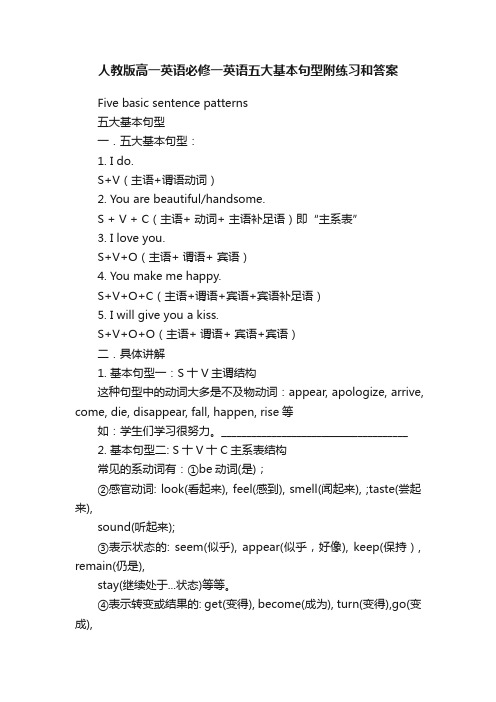
人教版高一英语必修一英语五大基本句型附练习和答案Five basic sentence patterns五大基本句型一.五大基本句型:1. I do.S+V(主语+谓语动词)2. You are beautiful/handsome.S + V + C(主语+ 动词+ 主语补足语)即“主系表”3. I love you.S+V+O(主语+ 谓语+ 宾语)4. You make me happy.S+V+O+C(主语+谓语+宾语+宾语补足语)5. I will give you a kiss.S+V+O+O(主语+ 谓语+ 宾语+宾语)二.具体讲解1. 基本句型一:S十V主谓结构这种句型中的动词大多是不及物动词:appear, apologize, arrive, come, die, disappear, fall, happen, rise等如:学生们学习很努力。
_____________________________________2. 基本句型二: S十V十C主系表结构常见的系动词有:①be动词(是);②感官动词: look(看起来), feel(感到), smell(闻起来), ;taste(尝起来),sound(听起来);③表示状态的: seem(似乎), appear(似乎,好像), keep(保持), remain(仍是),stay(继续处于...状态)等等。
④表示转变或结果的: get(变得), become(成为), turn(变得),go(变成),grow(渐渐变得), fall(变得), prove(证明)1)我们在任何时候都应该保持安静。
We should __________ __________ any time.2)这种食物尝起来很糟糕。
_________________________________________________.3) 春天到了,天气变得越来越暖和。
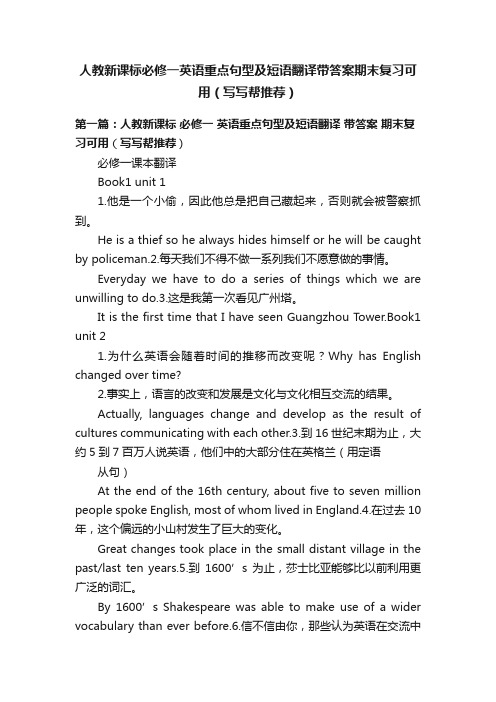
人教新课标必修一英语重点句型及短语翻译带答案期末复习可用(写写帮推荐)第一篇:人教新课标必修一英语重点句型及短语翻译带答案期末复习可用(写写帮推荐)必修一课本翻译Book1 unit 11.他是一个小偷,因此他总是把自己藏起来,否则就会被警察抓到。
He is a thief so he always hides himself or he will be caught by policeman.2.每天我们不得不做一系列我们不愿意做的事情。
Everyday we have to do a series of things which we are unwilling to do.3.这是我第一次看见广州塔。
It is the first time that I have seen Guangzhou Tower.Book1 unit 21.为什么英语会随着时间的推移而改变呢?Why has English changed over time?2.事实上,语言的改变和发展是文化与文化相互交流的结果。
Actually, languages change and develop as the result of cultures communicating with each other.3.到16世纪末期为止,大约5到7百万人说英语,他们中的大部分住在英格兰(用定语从句)At the end of the 16th century, about five to seven million people spoke English, most of whom lived in England.4.在过去10年,这个偏远的小山村发生了巨大的变化。
Great changes took place in the small distant village in the past/last ten years.5.到1600’s为止,莎士比亚能够比以前利用更广泛的词汇。

新概念英语第一册1-72课语法点总结1.物主代词我的你的他的她的它的我们的你们的他们的形容词性my your his her its our your their 名词性mine yours his hers its ours yours theirs●注意:形容词性物主代词具有依赖性,其后必须紧跟一个名词。
2.人称代词我你他她它我们你们他们主格I you he she it we you they 宾格me you him her it us you them 3.Be动词Be动词在一般现在时的三个变形:am, is, areBe动词在一般过去时的两个变形:was, were●注意:Be动词要根据主语的变化而变化。
4.一般疑问句定义:一般疑问句是指可以用Yes或者No回答的句子。
肯定句变为一般疑问句:若一个肯定句中存在Be动词am, is, are,则直接将Be动词提前,结尾加问号。
若一个肯定句中存在情态动词,则直接将情态动词提前,结尾加问号。
若一个肯定句中存在实义动词,则直接在句首加助动词do/does/did,实义动词变原形,结尾加问号。
注意:一般疑问句一般读为升调。
例:Are you a teacher? 你是一名老师吗?肯定回答:Yes, I am. 否定回答:No, I am not.Do you like English? 你喜欢英语吗?肯定回答:Yes, I do. 否定回答:No, I don’t.5.特殊疑问句定义:不能用Yes或者No回答的句子。
构成:特殊疑问词+ 一般疑问句特殊疑问词:what(什么), when(何时), where(何地), who (谁), whom(谁宾格), whose(谁的), which(哪个), why(为什么), how(怎么样)口诀:非常八加一6.不定冠词a/an若单词是以“a, e, i, o”四个元音开头,其前面选用“an”;若单词是以元音字母“u”开头,视情况而定。
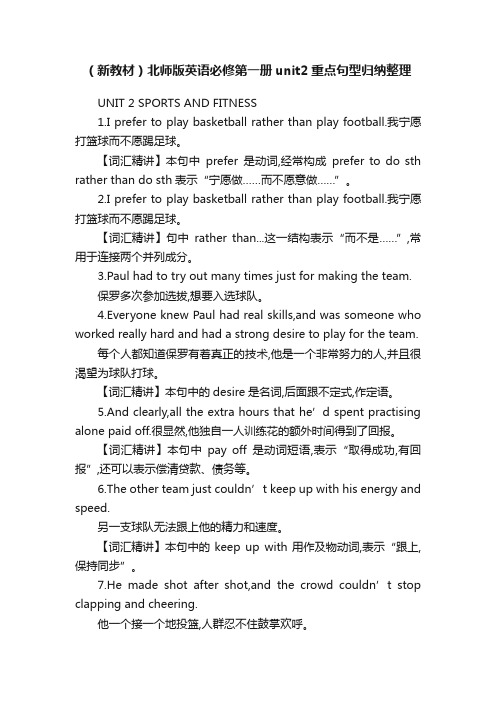
(新教材)北师版英语必修第一册unit2重点句型归纳整理UNIT 2 SPORTS AND FITNESS1.I prefer to play basketball rather than play football.我宁愿打篮球而不愿踢足球。
【词汇精讲】本句中prefer是动词,经常构成prefer to do sth rather than do sth表示“宁愿做……而不愿意做……”。
2.I prefer to play basketball rather than play football.我宁愿打篮球而不愿踢足球。
【词汇精讲】句中rather than...这一结构表示“而不是……”,常用于连接两个并列成分。
3.Paul had to try out many times just for making the team.保罗多次参加选拔,想要入选球队。
4.Everyone knew Paul had real skills,and was someone who worked really hard and had a strong desire to play for the team.每个人都知道保罗有着真正的技术,他是一个非常努力的人,并且很渴望为球队打球。
【词汇精讲】本句中的desire是名词,后面跟不定式,作定语。
5.And clearly,all the extra hours that he’d spent practising alone paid off.很显然,他独自一人训练花的额外时间得到了回报。
【词汇精讲】本句中pay off是动词短语,表示“取得成功,有回报”,还可以表示偿清贷款、债务等。
6.The other team just couldn’t keep up with his energy and speed.另一支球队无法跟上他的精力和速度。
【词汇精讲】本句中的keep up with用作及物动词,表示“跟上,保持同步”。

Lesson16-20核心语法1.be (am, is, are)2. Who is this young man?(L.17)3. air-hostesses, milkmen(L.18)4. There's an ice-cream man. (L. 19)语法扩展1.系动词be的一般现在时系动词be的基本含义为“是”。
在一般现在时中,系动词be有三种变化形式:1)当时语是第一人称单数时,系动词为am .如:I am a student.I am Chinese.2) 当主语是第三人称单数时,系动词为is.如:He is a teacher.She is a doctor.Mary is ill.3)当主语是第二人称单数以及所有人称复数的时候,系动词为are。
如:You are a nurse.You are my employees.These are my books.2.名词的复数形式(2)可数名词变成复数形式,除了一般规则在词尾直接加上-s外,还有一些不规则变化。
分别列举如下:1)以-s,-sh,-ch,-sh结尾的名词后面加-es构成复数形式。
如:class-classes bus-buses dress-dresseswish-wishes match-matches bench-benches2)以辅音字母加-y结尾的名词,改y为ies,变成复形式。
如:fly-flies city-cities lady-ladiesbelly-bellies duty-duties jury-juries3)以f或fe结尾的名词,一般将f或fe变为v,再加上-es,变为复数形式。
如:life-lives leaf-leaves wife-wivesknife-knives thief-thieves hoof-hooves4)以辅音字母o结尾的名词,一般在后面加-es构成复数形式。
如:potato-potatoes tomato-tomatoes hero-heroesnegro-Negroes echo-echoes5)有些名词通过内部元音替换的方式构成复数形式。

新概念英语第一册教材语法点盘点说明:本册书的语法出现层次性和规律性是很强的,首先我们先来整本书中都出了哪些时态,这些时态的具体分布和讲解时我们大家需要注意的递进性。
新一:总共144课。
看似洋洋洒洒的100多课,其实学起来并不难。
根据我的教课经验,新一分为3个等级,我记得我早些时候谈过。
1-72课是一等。
主要是学习最基础的词汇、基本的英语时态(一般现在、一般过去、一般将来等)、基本句型(陈述句、一般疑问句、特殊疑问句等)这些都是对于孩子们学习英语帮助很大的根基。
有些家长以自己的能力去看待这72课,就说很简单,没必要学。
我觉得很不负责,孩子不等同于家长。
学习应该是由易到难的,为什么因为简单就不学了呢?73-128课是第二等。
主要是学习较难的时态,比如现在完成和过去完成,但是不会讲得很深,只是初级介绍,做铺垫,因为新二会重点讲解。
只是告诉孩子这两个时态的构成,什么样子,有个概念。
还学习两个很重要的从句:宾语从句和定语从句。
也是浅浅地讲述基本构成和用法和最基本的使用规则以及认识标志词。
到新二就成为反复出现的重要知识点了。
这一级别出现的语法点是最多、最重要的。
所以这一级不能错过。
除了我说的那些大的语法点外,还有很多小的语法,考试很喜欢考。
比如:有的用法。
Have, have got, with, there be。
不定代词everyone, anyone, someone, no one等等。
129-144课是最难的一级。
讲述情态动词的多重用法,比如表示猜测。
情态动词是英文当中最常使用的,也是中国不擅长的。
所以新一用了很大篇幅去讲情态动词所表达的意境和语感,孩子也必须要好好学,不能错过。
到后面,还会出现if条件状语从句和被动语态。
都是为新二做铺垫的。
新二1-24课是一级。
重点重复出现新一里面的语法,在新二重点讲解了。
比如现在完成、过去完成、将来时、被动语态等。
课文长度加深了,孩子会觉得突然课文有点不好背了。
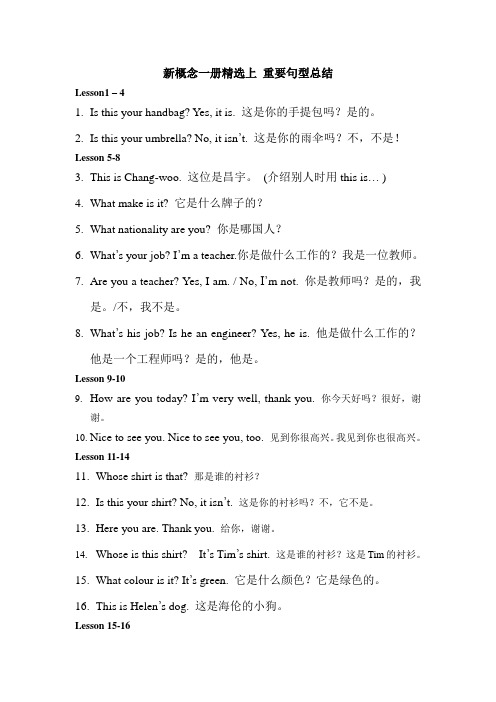
新概念一册精选上重要句型总结Lesson1 – 41.Is this your handbag? Yes, it is. 这是你的手提包吗?是的。
2.Is this your umbrella? No, it isn’t. 这是你的雨伞吗?不,不是!Lesson 5-83.This is Chang-woo. 这位是昌宇。
(介绍别人时用this is… )4.What make is it? 它是什么牌子的?5.What nationality are you? 你是哪国人?6.What’s your job? I’m a teacher.你是做什么工作的?我是一位教师。
7.Are you a teacher? Yes, I am. / No, I’m not. 你是教师吗?是的,我是。
/不,我不是。
8.What’s his job? Is he an engineer? Yes, he is. 他是做什么工作的?他是一个工程师吗?是的,他是。
Lesson 9-109.How are you today? I’m very well, thank you. 你今天好吗?很好,谢谢。
10.Nice to see you. Nice to see you, too. 见到你很高兴。
我见到你也很高兴。
Lesson 11-1411.Whose shirt is that? 那是谁的衬衫?12.Is this your shirt? No, it isn’t. 这是你的衬衫吗?不,它不是。
13.Here you are. Thank you. 给你,谢谢。
14.Whose is this shirt? It’s Tim’s shirt. 这是谁的衬衫?这是Tim的衬衫。
15.What colour is it? It’s green. 它是什么颜色?它是绿色的。
16.This is Helen’s dog. 这是海伦的小狗。

Lesson 16 A polite request 彬彬有礼的要求If you park your car in 1 wrong place, a traffic policeman will soon find 2 . You will be very 3 (luck) if he lets you go without a ticket. However, this does not always happen. Traffic police are sometimes very polite. During a holiday in Sweden, I found this note 4 my car:' Sir, we welcome you 5 our city. This is a "No Parking" area. You will enjoy 6 (you) stay here if you pay attention 7 our street signs. This note is only a 8 (remind).' If you receive a request like this, you cannot fail 9 (obey) it!Lesson 17 Always young 青年常驻My aunt Jennifer is 1 actress. She must be 2 least thirty-five years old. 3 spite of this, she often appears 4 the stage as a young girl. Jennifer will have to take part 5 a new play soon. This time, she will be a girl of seventeen. In 6 play, she must appear 7 a bright red dress and long black stockings. Last year in another play, she had to wear short 8 (sock) and a bright, orange-coloured dress. If anyone ever asked her how old she 9 (be), she always answers, 'My dear, it must be terrible 10 (be) grown up!'lesson18 He often does this! 他经常干这种事!After I had had lunch at 1 village inn, I looked 2 my bag. I had left 3 on a chair beside the door and now it wasn't there ! As I was looking for it, the inn-keeper came in. 'Did you have 4 good meal ?' he asked. 'Yes, thank you,' I 5 (answer), 'but I can't pay 6 bill. I haven't got my bag.' The inn-keeper smiled and 7 (immediate) went out. In a few 8 (minute) he returned with my bag and gave it back to me. 'I'm very sorry,' he said ' My dog had taken it 9 the garden. He often does this.'Lesson19 Sold out 票已售完'The play may begin 1 any moment,' I said.'It may have begun already,' Susan answered.'I hurried 2 the ticket-office. 'May I have two tickets please ?' I asked.'I'm sorry, we've sold 3 ,' the girl said.'What4 pity!' Susan exclaimed.Just then, a man hurried to the ticket-office.'Can I return these two tickets?' he asked.'5 (certain),' the girl said.'Could I have those two tickets please ?' I asked.'Certainly, 'the girl said, 'but they are for next Wednesday's 6 (perform).'I might as well have them,' I said 7 (sad).Lesson20 One man in a boat 独坐孤舟Fishing is my favourite sport. I often fish for 1 (hour) without 2 (catch) anything. But this does not worry me. Some 3 (fisherman) are unlucky. Instead 4 catching fish, they catch old boots and rubbish. I am even 5 (little)lucky. I never catch anything-not even old boots. After 6 (have) spent whole mornings on the river, I always go home with 7 empty bag. 'You must give 8 fishing!' my friends say.' It's 9 waste of time.' But they don't realize one important thing. I'm not 10 (real) interested in fishing. I am only interested in 11 (sit) in a boat and doing nothing 12 all !Lesson21 Mad or not? 是不是疯了?Aeroplanes are 1 (slow) driving me mad. I live near an airport and 2 (pass) planes can be heard night 3 day. The airport was 4 (build)during the war, 5 for some reasons it could not be used then. Last year, 6 , it came into use. Over a hundred people must have been 7 (drive) away from their homes by the noise. I am one of the few people left. Sometimes I think this house will be 8 (knock) down by a passing plane. I have been offered 9 large sum of money to go away, but I am determined to stay here. Everybody says I must be mad and they are probably right.Lesson22 A glass envelope 玻璃信封My daughter, Jane, never dreamed 1 receiving a letter from a girl of her own age 2 Holland. Last year, we were travelling 3 the Channel and Jane put 4 piece of paper with her name and address on it into a bottle. She threw the bottle 5 the sea. She never thought of it again, but ten months 6 (late), she received a letter from a girl in Holland. Both girls write to each other 7 (regular) now. However, they have decided 8 (use)the post-office. Letters will cost a litt1e more, 9 they will certainly travel faster.Lesson23 A new house 新居I had a letter 1 my sister yesterday. She lives in Nigeria. In her letter, she said that she would come2 England next year. If she comes, she will get3 surprise. We are now living in a beautiful new house in the country. Work on it had begun before my sister left. The house was4 (complete) five months ago. In my letter, I told her that she could stay5 us. The house has many large rooms and there is a6 (love) garden. It is a very modern house, so it looks strange to some people. It must be the only modern house in7 district.。
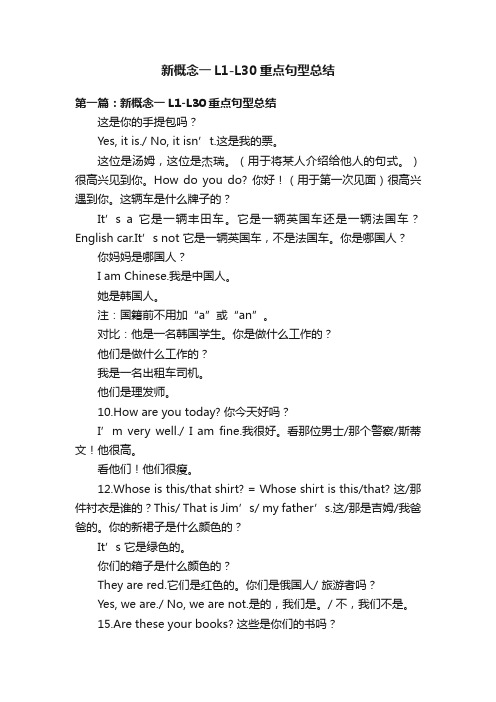
新概念一L1-L30重点句型总结第一篇:新概念一L1-L30重点句型总结这是你的手提包吗?Yes, it is./ No, it isn’t.这是我的票。
这位是汤姆,这位是杰瑞。
(用于将某人介绍给他人的句式。
)很高兴见到你。
How do you do? 你好!(用于第一次见面)很高兴遇到你。
这辆车是什么牌子的?It’s a 它是一辆丰田车。
它是一辆英国车还是一辆法国车?English car.It’s not 它是一辆英国车,不是法国车。
你是哪国人?你妈妈是哪国人?I am Chinese.我是中国人。
她是韩国人。
注:国籍前不用加“a”或“an”。
对比:他是一名韩国学生。
你是做什么工作的?他们是做什么工作的?我是一名出租车司机。
他们是理发师。
10.How are you today? 你今天好吗?I’m very well./ I am fine.我很好。
看那位男士/那个警察/斯蒂文!他很高。
看他们!他们很瘦。
12.Whose is this/that shirt? = Whose shirt is this/that? 这/那件衬衣是谁的?This/ That is Jim’s/ my father’s.这/那是吉姆/我爸爸的。
你的新裙子是什么颜色的?It’s 它是绿色的。
你们的箱子是什么颜色的?They are red.它们是红色的。
你们是俄国人/ 旅游者吗?Yes, we are./ No, we are not.是的,我们是。
/ 不,我们不是。
15.Are these your books? 这些是你们的书吗?Yes, they are./ No, they aren’t.是的。
/ 不是。
给我/他/她/我们/他们一个箱子。
哪一个?大的那个。
给我/他/她/我们/他们一些箱子。
哪些?大的那些。
那只杯子在哪儿?它在桌子上。
那些杯子在哪儿?它们在桌子上。
房间里有一台电视。
桌子旁边有几张椅子。
(There be句型:某地有某物)20.What must I do? 我该做点什么呢?Sweep the floor!扫地去吧。

新人教版英语必修一重点句型必背U41.Imagine your home begins to shake and you must leave it right away. 假设你家房子开始晃动,你必须立刻离开。
2.What do you think will happen before an earthquake ” 你认为地震前将会发生什么?(双重疑问句)3.In the farm farmyards, the chickens and even the pigs were too nervous to eat. 在农家院里,鸡甚至猪都紧张的吃不下东西。
4.Mice ran out of the fields looking for places to hide. 老鼠从地里跑出来寻找藏身之处。
(looking for places to hide 为现在分词短语,做伴随状语,伴随动作ran out。
)5.At about 3:00 am on July 28, 1976, some people saw bright lights in the sky.(时间表达)6.It seemed that the world was at an end as the earthquake destroyed nearly everything. 世界似乎到了末日,因为地震几乎毁了一切。
(It seemed as if the world was at an end!= It seemed that the world was at an end!)7.It was felt in Beijing, which is more than two hundred kilometers away. 200千米以外的北京市都感觉到了地震声。
8.An earthquake left the whole city in ruins. 地震过后,全城到处是残垣断壁。
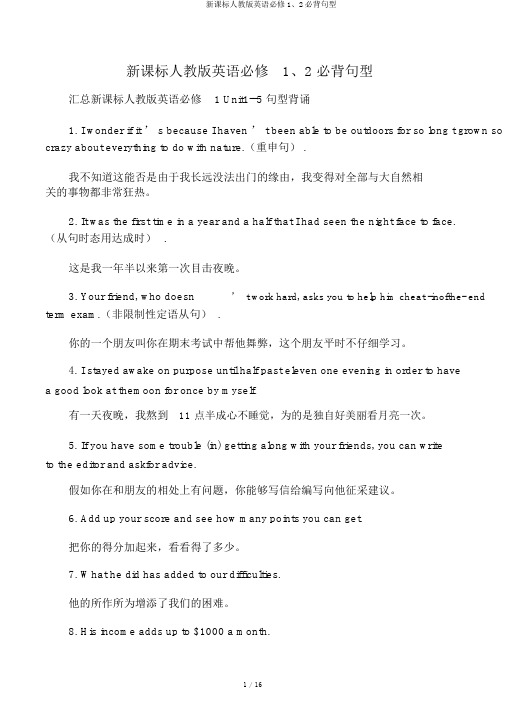
新课标人教版英语必修1、2必背句型新课标人教版英语必修1、2 必背句型汇总新课标人教版英语必修 1 Unit1--5 句型背诵1. I wonder if it ’ s because I haven ’ t been able to be outdoors for so long t grown so crazy about everything to do with nature.(重申句) .我不知道这能否是由于我长远没法出门的缘由,我变得对全部与大自然相关的事物都非常狂热。
2. It was the first time in a year and a half that I had seen the night face to face.(从句时态用达成时).这是我一年半以来第一次目击夜晚。
3. Your friend, who doesn’ t work hard, asks you to help him cheat -inofthe- end term exam.(非限制性定语从句) .你的一个朋友叫你在期末考试中帮他舞弊,这个朋友平时不仔细学习。
4.I stayed awake on purpose until half past eleven one evening in order to havea good look at themoon for once by myself.有一天夜晚,我熬到11 点半成心不睡觉,为的是独自好美丽看月亮一次。
5.If you have some trouble (in) getting along with your friends, you can writeto the editor and askfor advice.假如你在和朋友的相处上有问题,你能够写信给编写向他征采建议。
6. Add up your score and see how many points you can get.把你的得分加起来,看看得了多少。
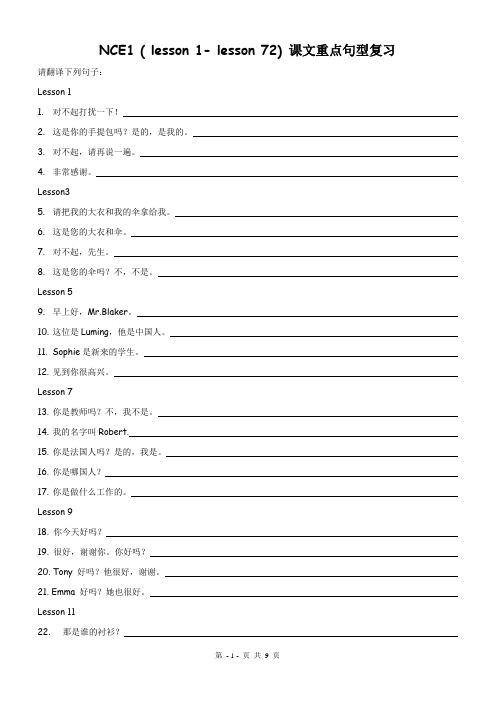
NCE1 ( lesson 1- lesson 72) 课文重点句型复习请翻译下列句子:Lesson 11.对不起打扰一下!2.这是你的手提包吗?是的,是我的。
3.对不起,请再说一遍。
4.非常感谢。
Lesson35.请把我的大衣和我的伞拿给我。
6.这是您的大衣和伞。
7.对不起,先生。
8.这是您的伞吗?不,不是。
Lesson 59.早上好,Mr.Blaker。
10.这位是Luming,他是中国人。
11.Sophie是新来的学生。
12.见到你很高兴。
Lesson 713.你是教师吗?不,我不是。
14.我的名字叫Robert.15.你是法国人吗?是的,我是。
16.你是哪国人?17.你是做什么工作的。
Lesson 918. 你今天好吗?19. 很好,谢谢你。
你好吗?20. Tony 好吗?他很好,谢谢。
21. Emma 好吗?她也很好。
Lesson 1122.那是谁的衬衫?第- 1 - 页共9 页23.这不是我的衬衫。
我的衬衫是蓝色的。
24.这是Tim的衬衫吗?也许是,先生。
25.给你,接着!谢谢您,先生。
Lesson 1326.你的新连衣裙是什么颜色?27.到楼上来看看吧。
28.这连衣裙真好,真漂亮。
29.(它是)一样的颜色,也是绿的。
Lesson 1530.请出示你们的护照。
给您。
31.你们是瑞典人吗?32.不,我们不是。
我们是丹麦人。
33.你们是来旅游的吗?是的,我们是(来旅游的)。
Lesson 1734.你好!35.来见见我们得雇员。
36.那些姑娘很勤快。
37.他们是做什么工作的?38.他们是电脑录入员。
39.他们是推销员,他们非常懒。
40.这个年轻人是谁?Lesson 1941.怎么了,孩子们?42.我们累了也渴了,妈妈。
43.坐在这儿吧。
44.你们现在好些了吗?不,还没有。
45.瞧,有个卖冰激凌的。
46.这些冰激凌真好吃。
Lesson 2147.请拿本书给我。
第- 2 - 页共9 页48.哪一本?这本?49.不,不是那本,是红色那本。
新一关键句型16-20
1来见见我们的雇员2那些姑娘很勤快。
3那个年轻人是谁?4他是我们办公室的勤杂人员。
5他们是推销员。
6他们是做什么工作的?
7怎么啦,孩子们?8我们又累又渴。
9请拿两份冰琪淋。
10看他们,他们热。
1来见见我们的雇员2那些姑娘很勤快。
3那个年轻人是谁?4他是我们办公室的勤杂人员。
5他们是推销员。
6他们是做什么工作的?
7怎么啦,孩子们?8我们又累又渴。
9请拿两份冰琪淋。
10看他们,他们热。
1来见见我们的雇员2那些姑娘很勤快。
3那个年轻人是谁?4他是我们办公室的勤杂人员。
5他们是推销员。
6他们是做什么工作的?
7怎么啦,孩子们?8我们又累又渴。
9请拿两份冰琪淋。
10看他们,他们热。
1来见见我们的雇员2那些姑娘很勤快。
3那个年轻人是谁?4他是我们办公室的勤杂人员。
5他们是推销员。
6他们是做什么工作的?
7怎么啦,孩子们?8我们又累又渴。
9请拿两份冰琪淋。
10看他们,他们热。
1来见见我们的雇员2那些姑娘很勤快。
3那个年轻人是谁?4他是我们办公室的勤杂人员。
5他们是推销员。
6他们是做什么工作的?
7怎么啦,孩子们?8我们又累又渴。
9请拿两份冰琪淋。
10看他们,他们热。
1来见见我们的雇员2那些姑娘很勤快。
3那个年轻人是谁?4他是我们办公室的勤杂人员。
5他们是推销员。
6他们是做什么工作的?
7怎么啦,孩子们?8我们又累又渴。
9请拿两份冰琪淋。
10看他们,他们热。
1来见见我们的雇员2那些姑娘很勤快。
3那个年轻人是谁?4他是我们办公室的勤杂人员。
5他们是推销员。
6他们是做什么工作的?
7怎么啦,孩子们?8我们又累又渴。
9请拿两份冰琪淋。
10看他们,他们热。
1来见见我们的雇员2那些姑娘很勤快。
3那个年轻人是谁?4他是我们办公室的勤杂人员。
5他们是推销员。
6他们是做什么工作的?
7怎么啦,孩子们?8我们又累又渴。
9请拿两份冰琪淋。
10看他们,他们热。
1来见见我们的雇员2那些姑娘很勤快。
3那个年轻人是谁?4他是我们办公室的勤杂人员。
5他们是推销员。
6他们是做什么工作的?
7怎么啦,孩子们?8我们又累又渴。
9请拿两份冰琪淋。
10看他们,他们热。